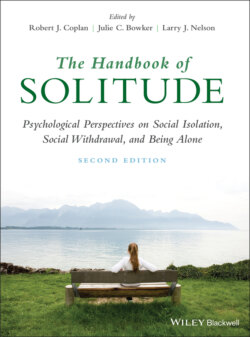Читать книгу The Handbook of Solitude - Группа авторов - Страница 81
Parent and peer attitudes.
ОглавлениеIt has been argued that as major socialization agents, parents and peers are crucial in “transmitting” cultural influence on children’s behaviors (Chen, 2012; Super & Harkness, 1986). Consistent with the argument, research findings have indicated that cultural values concerning socialization goals and practices may be reflected in parental and peers’ attitudes toward social withdrawal in children (e.g., Chen, 2018).
In Western cultures, an important socialization goal is to help children develop independence and self‐confidence (Maccoby & Martin, 1983). Social withdrawal, particularly shyness that is derived from internal fear and anxiety, is regarded as incompatible with the socialization goal (Rubin et al., 2009). Research in North America and Western Europe have shown that parents view shy, wary, and anxious behavior as indicating social immaturity and thus often express negative attitudes toward the behavior (e.g., Hane et al., 2008; Rubin et al., 2009; Tani et al., 2014; van Zalk et al., 2011). When children display shy behavior in social settings, parents tend to respond with worry, disappointment, and rejection (Chen et al., 1998; Rubin et al., 2002; Tani et al., 2014). Moreover, parents may use high‐power and coercive strategies, such as direct command, reprimand, and punishment, in their interactions with children in an effort to help them reduce shy behavior (Chen et al., 1998; Rubin et al., 1999).
In many group‐oriented cultures, children are encouraged to learn behaviors that are conducive to interpersonal harmony and group well‐being, such as cooperation, conforming to social norms, and self‐constraint, whereas independence, self‐direction, and positive self‐regard are not highly valued in socialization (Greenfield et al., 2006). Accordingly, shyness seems to be more accepted in group‐oriented cultures than in Western individualistic cultures. Chen, Rubin et al. (1997), for example, found in a sample of school‐age children in China that shyness was positively associated with maternal acceptance and negatively associated with maternal rejection. Chen et al. (1997) reported that shyness was negatively associated with parental high‐power parenting attitudes (e.g., “I do not allow my child to question my decisions,” “I believe that scolding and criticism make my child improve”) in Chinese children. Kim et al. (2008) found shyness was positively associated with social support from parents in Korea, whereas the association was not significant in Australian children. These results indicate that, unlike their Western counterparts, shy children in East Asia receive parental support, experience little pressure from parents to change their behavior, and, in general, live in a relatively desirable social environment.
Different cultural values are also reflected in peer attitudes toward social withdrawal. In Western societies, shyness is typically associated with negative peer attitudes, such as peer rejection or exclusion, because shy children are often seen by peers as incompetent and deviant (Rubin et al., 2009). In societies where social assertiveness and self‐expression are less valued, peers tend to have more positive perceptions of shyness and are more likely to accept shy children. Different peer attitudes toward children’s shyness have been found in a series of studies conducted by Chen and colleagues in the early 1990s in Canada and China (e.g., Chen et al., 1992; Chen et al., 1997). In an observational study conducted in 1996–1997 with samples of four‐year‐olds, Chen, DeSouza et al. (2006) found that peers were more likely to use direct demands, verbal teasing, or other negative social strategies when making voluntary initiations to shy children than to non‐shy children in Canada, whereas peers used similar strategies in their initiations to shy and non‐shy children in China. When shy children made social initiation, peers were more likely to display overt rejection, disagreement, and intentionally ignoring in Canada but responded more positively by showing approval and support in China.
It should be noted that social attitudes toward shyness in Chinese children have become increasingly negative in recent years as China has changed rapidly to a competitive market‐oriented society in which individual assertiveness and initiative‐taking are required to adapt and achieve success in the environment. For example, Chen and colleagues (2014) and Yan et al. (2016) found in urban Chinese samples that children’s shyness was positively associated with parental power‐assertive parenting and negatively associated with parental support. In addition, several recent studies showed that shyness in childhood and adolescence was positively associated with peer rejection in urban China (e.g., Chen et al., 2005; Liu et al., 2015; Liu et al., 2018).
